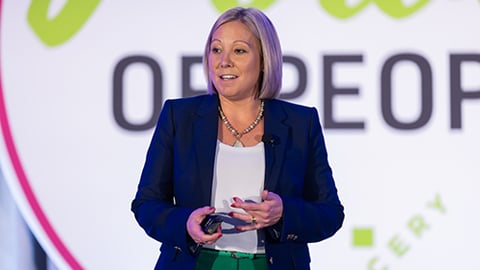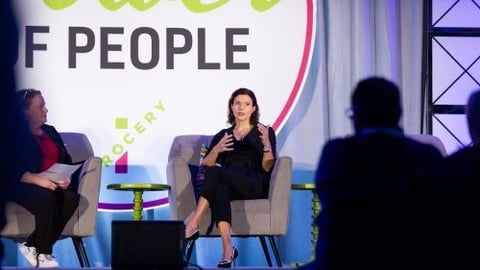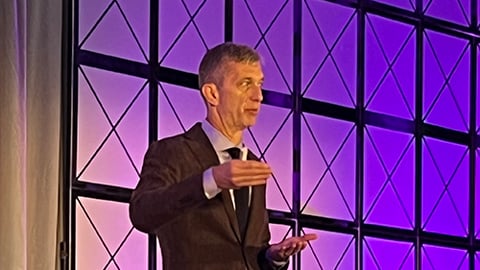Food Waste Programs Do More Than Lower Landfills
As food waste piles up in the United States, efforts are being made to chip away at the problem. During Progressive Grocer’s recent Grocery Impact event in Orlando, Fla., two panelists spotlighted some of those initiatives that help producers and retailers cut down on the estimated 30% to 40% of food that is wasted in this country each year.
Phil Collins, senior national account executive, retail and industrial sales at specialty waste and environmental services company Denali, and Christina Glentis, lead buyer at online grocery marketplace Martie, sat down with PG’s Managing Editor Bridget Goldschmidt to explore collective endeavors to keep unused food out of landfills.
[RELATED: TWIG Trailblazers Past and Present Share Insights at Grocery Impact]
Curbing food waste is important to Martie and personal for Glentis, who works to foster vendor relationships to ensure that good food isn’t wasted. “I really started with our co-founders, Louise Fritjofsson and Kari Morris, who were food producers and found themselves in this position where they had overstock and didn’t really have an avenue to sell it. They had this ‘a-ha moment,’ where they realized there was a need and decided to pivot and really solve the issue they found within the food space,” she recalled.
Martie has a unique business model in that the company delivers shelf-stable groceries and household items at a deep discount by partnering with brands to purchase surplus inventory that includes foods that would otherwise be tossed.
Meanwhile, Collins and the team at Denali were tackling environmental issues through their own innovations. “Denali started about 10 years ago, trying to find solutions to clean wastewater. That is still one of the sustainable services we provide, but over time and through acquisitions, we started to dip into the food waste dilemma we have in this country and work with retailers, grocers and restaurants,” he shared.
The passion that the respective organizations and leaders had for curbing waste led them to work jointly to optimize the food supply. “About 40% of food gets thrown away, but in spite of that, there are still 44 million Americans faced with food insecurities. What I really love about what we are trying to do is to combat two problems at once. We are not only helping landfills but also providing for people to access good quality food at a discounted price and make it more affordable,” Glentis said.
Denali’s approach is to collect food waste from thousands of locations across the United States and divert those nutrients to use in things like animal feed, compost and energy that help create a more circular and sustainable system. The company works with a variety of grocery businesses, including Martie, sending in trucks to recycle food and also providing insights on environmental progress. “We are a very data-driven company and most of our partners are as well. We don’t take the approach of setting 300 stores up with food recycling program and saying, ‘Hey, here are the keys, good luck.’ For us, it’s about providing data on a monthly basis,” Collins explained.
Transparency is crucial in such collaborative efforts, the presenters agreed. “We're communicating to the consumer and to our customers that the reason that these products are on our side, why they're here, it's not because there's anything wrong with the product, but it's just about a supply chain problem that we're trying to help solve,” Glentis said.
The ability to divert usable products is getting better, too, thanks to emerging technologies. “We use technology pretty much in every aspect of what we do. Without going into too much detail, we're actually working on some proprietary technology utilizing AI to make sure that our processes are fast and efficient so that we can get as much good food to the customers as quickly as possible,” reported Glentis.
Collins also highlighted initiatives that improve its processes, such as recent de-packaging services that Denali launched with Walmart and Sam’s Club stores around the country. “Prior to the last 12 months, we were predominantly servicing just clean bulk food waste. Well, packaged food waste also makes up a large percentage of the food waste that goes into landfills. So, we came up with a program call Zero De-Pack, where we have strategically placed de-packaging machines at some of our compost sites and some of our feed lots,” he said. “Store members can actually throw in all of their packaged food waste, too, and that gets commingled, brought back to our compost site and run through a de-packager that will separate the packaging from the food waste,” he said.
In addition, Denali is now bagging finished compost and offering it back to retail partners. “They're able to put it on their shelves and generate revenue from it, which is a good thing,” Collins pointed out.







